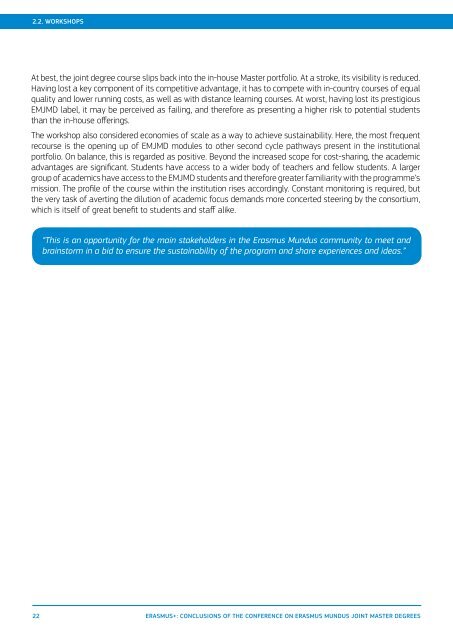Erasmus+
2kWLqbT
2kWLqbT
You also want an ePaper? Increase the reach of your titles
YUMPU automatically turns print PDFs into web optimized ePapers that Google loves.
2.2. WORKSHOPS 2.2. WORKSHOPS TITLE<br />
WORKSHOP 4: STUDENT ISSUES AND PERSPECTIVES<br />
At best, the joint degree course slips back into the in-house Master portfolio. At a stroke, its visibility is reduced.<br />
Having lost a key component of its competitive advantage, it has to compete with in-country courses of equal<br />
quality and lower running costs, as well as with distance learning courses. At worst, having lost its prestigious<br />
EMJMD label, it may be perceived as failing, and therefore as presenting a higher risk to potential students<br />
than the in-house offerings.<br />
The workshop also considered economies of scale as a way to achieve sustainability. Here, the most frequent<br />
recourse is the opening up of EMJMD modules to other second cycle pathways present in the institutional<br />
portfolio. On balance, this is regarded as positive. Beyond the increased scope for cost-sharing, the academic<br />
advantages are significant. Students have access to a wider body of teachers and fellow students. A larger<br />
group of academics have access to the EMJMD students and therefore greater familiarity with the programme’s<br />
mission. The profile of the course within the institution rises accordingly. Constant monitoring is required, but<br />
the very task of averting the dilution of academic focus demands more concerted steering by the consortium,<br />
which is itself of great benefit to students and staff alike.<br />
“This is an opportunity for the main stakeholders in the Erasmus Mundus community to meet and<br />
brainstorm in a bid to ensure the sustainability of the program and share experiences and ideas.”<br />
Nearly 19.000 students from around the globe have pursued an Erasmus Mundus Master degree. They originate<br />
from close to 200 countries around the world. Over the last ten years the student selection has become more<br />
and more competitive: while in 2007, 14 out of 100 excellent students were awarded a scholarship, in 2016<br />
it is only the top 6 students (out of 100) to receive an EMJMD scholarship. The central aspect to the student<br />
experience is mobility; EMJMD students travel to and live in at least two, mostly European, countries during<br />
their programme.<br />
With the experience of mobility come opportunities, such as belonging to an international network and<br />
enjoying enhanced employability perspectives, as well as encountering different cultural realities. A unique<br />
feature of the EMJMD student experience is the intense learning which takes place both within and outside<br />
an international classroom and which blends academic knowledge with valuable intercultural competences.<br />
At the same time, a highly mobile degree programme presents a number of challenges, such as visa processes,<br />
cultural adjustment, and the time and energy needed to move from one location to another.<br />
Workshop discussions<br />
The discussions in the fourth workshop confirmed the aspects raised in the other three, but with a stronger<br />
student-centred focus.<br />
The pull factors<br />
Unsurprisingly, the EMA Graduate Impact<br />
Survey revealed that 65% of respondents<br />
cited scholarships as their major<br />
motivating factor, followed by 51% who<br />
were attracted by possibility of living and<br />
studying in Europe, and 45% attracted by<br />
the academic level of the EMJMD. This<br />
underlines the difficulties experienced by<br />
EMJMD courses: once their EU funding is<br />
terminated; they may be just as inherently<br />
attractive, but they may fail to attract.<br />
Over half of the graduates, when asked<br />
which of the widely rehearsed benefits<br />
they rated most highly, pointed to<br />
intercultural competence. This, too, is<br />
perhaps unsurprising, since it is a versatile<br />
competence which can satisfy personal,<br />
social and labour market needs.<br />
The workshop participants looked carefully at the pull factors, of which by far the most powerful was the hope<br />
that graduation would lead to satisfying employment. Despite the fact that – according to the Survey – two<br />
thirds of EMJMD graduates had found jobs (the majority within two months), 73% considered ‘the links to<br />
employment to be too weak’ during their study period.<br />
Participants were of course aware of the background. Despite the efforts of institutions and enterprises, as<br />
well as ten years of dialogue sponsored by the European Commission’s University-Business Forum, productive<br />
working relationships have never been easy to construct. While some disciplines lend themselves more readily<br />
than others to collaborative input, the respective cultures, priorities, timeframes of the two sectors do not<br />
automatically fall into alignment.<br />
22 ERASMUS+: CONCLUSIONS OF THE CONFERENCE ON ERASMUS MUNDUS JOINT MASTER DEGREES<br />
ERASMUS+: CONCLUSIONS OF THE CONFERENCE ON ERASMUS MUNDUS JOINT MASTER DEGREES<br />
23


